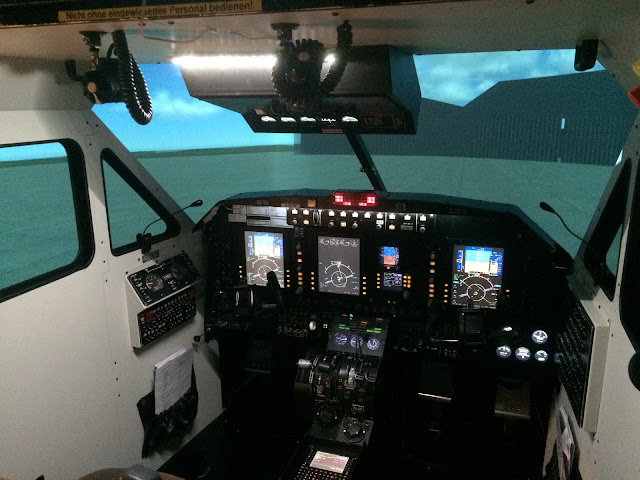But for now, the MCC course:
The final part in a professional pilot program is the MCC course. Up until now, I've always flown with single-pilot procedures and every flight has been essentially a single-pilot flight whether the instructor has been on board or not. The student is the one controlling the airplane and handling all in-flight planning, communications and management. The instructor is there just to instruct.
As we know, all modern airline operations are being flown with a crew of at least two pilots, usually a Captain and a First Officer. This is why pilot training must include an MCC course, with MCC standing for Multi-Crew Cooperation. During this course, the goal is to learn the basics of the multi-crew procedures that are used in all airlines, with some variations of course. The whole training is done in a simulator only and real flying with an aircraft is not included at all in the course.
 |
| Our simulator for the week |
The most essential concept of multi-crew operation is that of the Pilot Flying, PF, and the Pilot Monitoring PM (or Pilot Not Flying, PNF). This means that there is always just one pilot who flies the airplane and is directly responsible of the lateral and longitudinal state of the aircraft at all times. This can be done from either seat, of course. The other pilot, PM, is a monitoring pilot whose primary duty is basically everything but flying the aircraft: Monitoring the flying pilot and helping and supporting him/her in all ways, filling the paperwork, handling the radio communications, operating certain systems on the PF's command (such as landing gear, flaps etc.), and many other duties.
Of course there is much more to MCC, but this is the core concept :)
 |
| EFIS displays with a PFD and an MFD |
Our MCC course was held in Strausberg, Germany, which is located near Berlin. There is an airfield called EDAY, which seemed to be a popular sports airfield and flight school area. Our flight school there was Aerotours Flight Training, that also operated some sight-seeing flights. They had a King Air 200 GTX, FNPTII simulator that we used for the duration of the training.
The first day we had a theoretical ground course covering the basics of MCC and the flight school SOP's and other procedures. Most of it was about the same that we had already done in Finland, but the company anyway wanted to have their own version of the training anyway. This was okay, since it was good to learn the local differences in philosophy and of course the type-specific things and SOP's that Aerotours wanted us to use.
 |
| Some GPWS training near steep terrain |
After the initial ground training, our days consisted of a four-hour session, with two hours as PF and two hours as PM. Usually the training started very early in the morning, so we had a lot of free time during the course and could visit Berlin for a few times and hang around at the airfield or in my room watching Netflix. Of course we did some studying too.. :)
The flying consisted of many different scenarios related to MCC, like diversions to alternate airports, decision-making due to technical issues, some TCAS procedures and of course a lot of engine failure procedures, as always is the case with multi-engine airplanes. I don't really have that much to say about the training, since it all started to be very familiar after the first couple of days.
 |
| 30 degree bank |
At times it even felt that the program was a bit too repetitive, and I would have liked to focus more on creative decision-making rather than the "clear as CAVOK" procedures like go-around's and engine failures during initial climb, or TCAS RA procedures, that have their challenges of course but that don't really require you to think. You only need to do what has to be done, and do it correctly.
In the final simulator flight we tried the Hudson River scenario just for fun and I actually managed to make a nice ditching landing into the river. My course mate was much more creative, and realizing that a King is much lighter and more nimble than an Airbus, he just turned around and landed back to the airport..!
 |
| Final sim session behind us! |
With that, the MCC course was finished and this naturally meant that my whole flight training was done. After getting the necessary paperwork done, I was now a fully graduated commercial pilot!

Ei kommentteja:
Lähetä kommentti